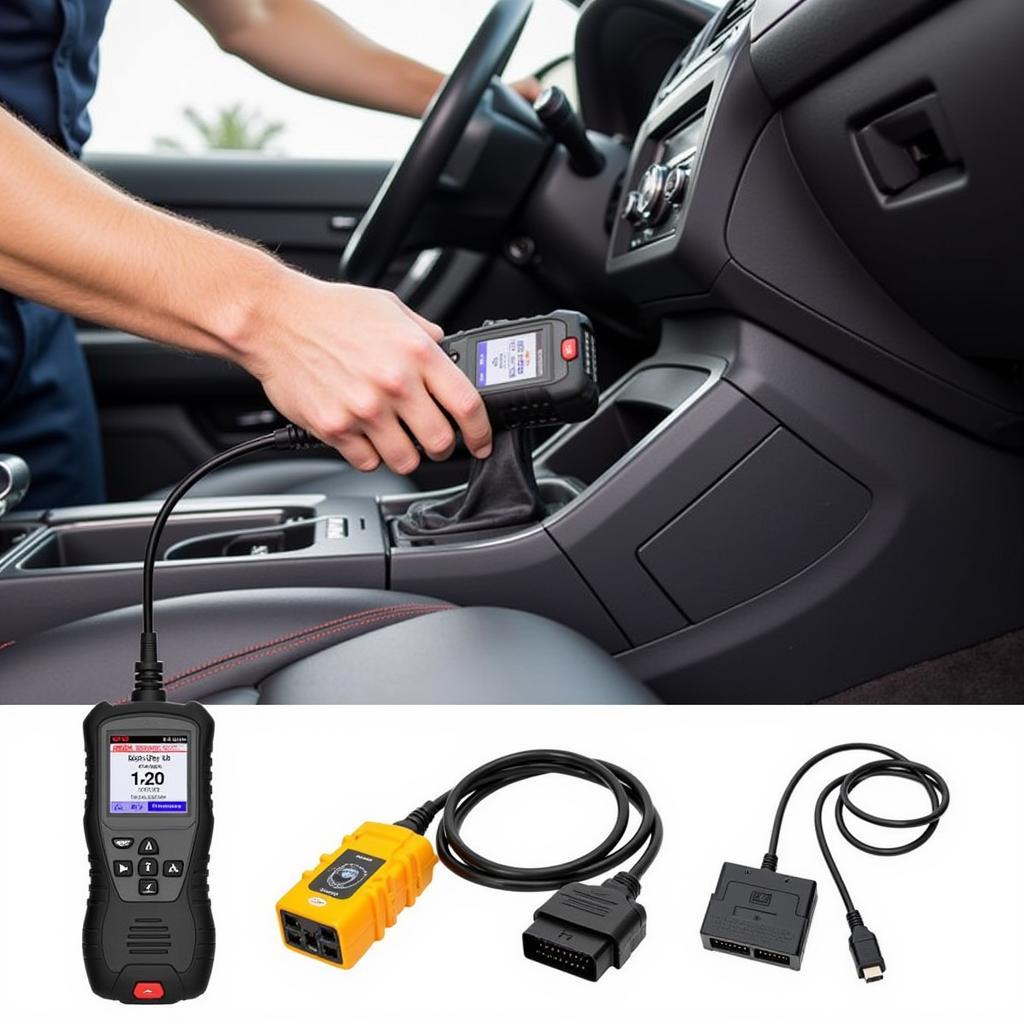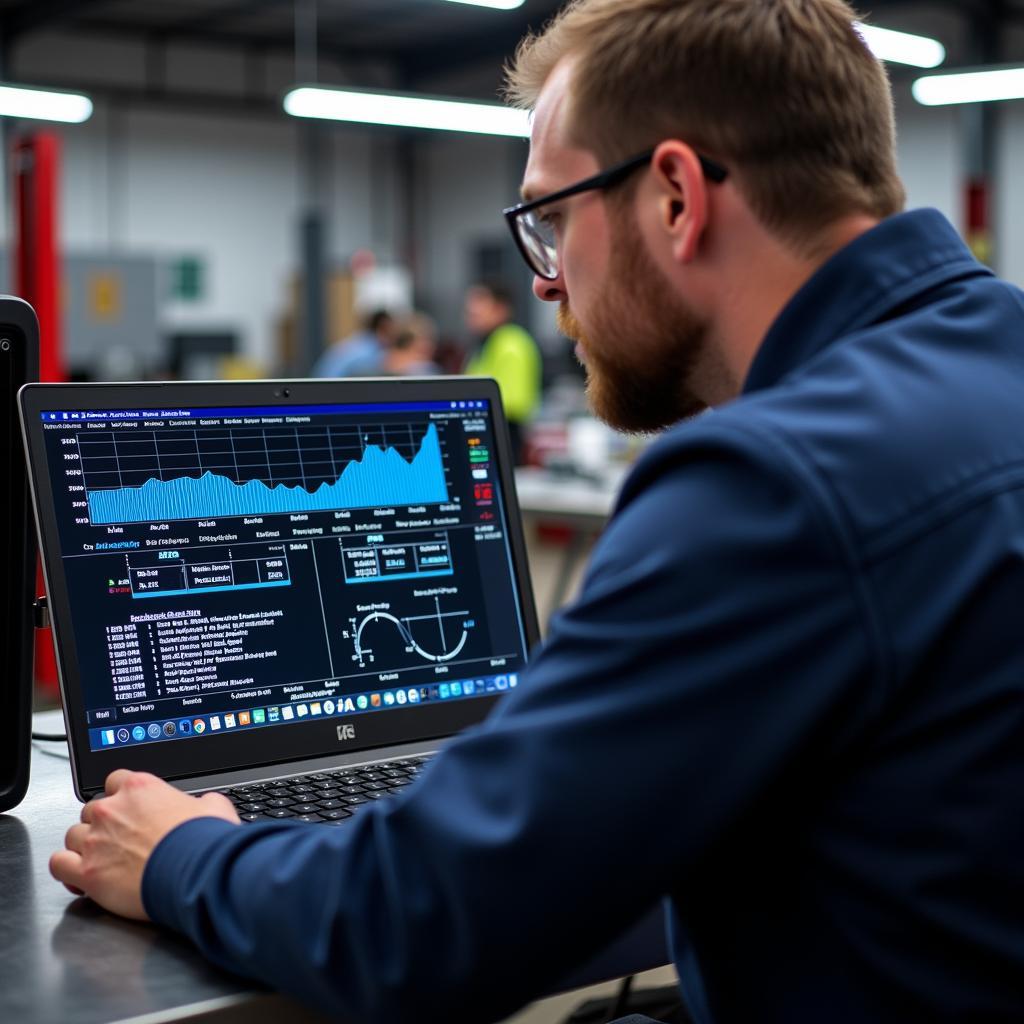When it comes to car troubles, understanding the terminology can sometimes feel like learning a new language. Two terms that often cause confusion are “diagnostic” and “diagnosis.” While they seem similar, knowing the difference can help you better understand the process of identifying and addressing issues with your vehicle.
Diagnostic vs. Diagnosis: What’s the Difference?
The distinction is simple:
- Diagnostic (adjective): Relates to the process of identifying a problem. A “diagnostic test” is performed to gather information about your car’s condition.
- Diagnosis (noun): The actual identification of the problem after analyzing the information gathered. For example, “The mechanic’s diagnosis was a faulty oxygen sensor.”
Think of it like this: a doctor uses a stethoscope (diagnostic tool) to listen to your lungs and performs tests (diagnostic procedures) to reach a diagnosis (identification of the illness).
Car Diagnostics: Delving Deeper
In the context of cars, “diagnostic” usually refers to car diagnostic tools and computer diagnostic tests.
- Car diagnostic tools: These are electronic devices that connect to your vehicle’s onboard computer system, often through the OBD-II port. These tools can read and interpret data from various sensors and systems within your car.
- Computer diagnostic tests: These tests utilize diagnostic tools to retrieve and analyze data, pinpoint the root cause of a problem, and often provide specific trouble codes.
 Car Diagnostic Tools and OBD2 Port
Car Diagnostic Tools and OBD2 Port
The Importance of Accurate Car Diagnostics
Accurate car diagnostics are essential for a number of reasons:
- Time-saving: Rather than relying on trial-and-error, diagnostics quickly pinpoint the source of the problem. This saves you valuable time and potentially unnecessary repairs.
- Cost-effective: By identifying the exact issue, you avoid spending money on replacing parts that are still functional.
- Safer Driving: Diagnosing and fixing issues promptly ensures your vehicle operates safely and reduces the risk of breakdowns or accidents.
Common Uses of Car Diagnostics
Car diagnostics are used to identify a wide range of problems, including:
- Engine issues: Misfires, loss of power, poor fuel economy
- Transmission problems: Slipping gears, rough shifting
- Brake system malfunctions: ABS warnings, spongy brakes
- Electrical problems: Battery issues, faulty sensors, wiring problems
- Emissions system faults: Check engine light related to emissions
 Mechanic Analyzing Diagnostic Results on a Computer
Mechanic Analyzing Diagnostic Results on a Computer
Understanding Your Car’s Diagnosis
While professional mechanics have advanced diagnostic tools and expertise, there are resources available to help you understand basic car diagnostics.
- OBD-II Scanners: Affordable scanners can be purchased to read basic trouble codes.
- Online Resources: Websites and forums dedicated to car repair often provide information on interpreting trouble codes.
However, it’s important to note that while these resources can be helpful, they often require some level of mechanical knowledge.
DiagFixPro: Your Partner in Car Diagnostics
Navigating the world of car diagnostics can be overwhelming, but it doesn’t have to be. DiagFixPro is here to provide you with the information and resources you need to make informed decisions about your vehicle’s health.
We offer:
- Computer car diagnostic: Our expert technicians use state-of-the-art diagnostic equipment to accurately identify any issues with your vehicle.
- Electrical car diagnostic: We specialize in diagnosing and repairing complex electrical systems in modern vehicles.
- Transparent Communication: We believe in empowering our customers with knowledge. We explain the diagnostic process, the findings, and the recommended repairs in a clear and understandable way.
“Accurate diagnostics are the foundation of effective car repair. At DiagFixPro, we’re committed to using the latest technology and our expertise to ensure your vehicle is diagnosed and repaired correctly the first time.” – John Smith, Senior Automotive Technician at DiagFixPro
Conclusion
Understanding the difference between “diagnostic” and “diagnosis” and familiarizing yourself with the basics of car diagnostics can save you time, money, and frustration. Whether you’re a car enthusiast or simply want to be an informed car owner, knowing the language of car repair empowers you to make the best decisions for your vehicle.
Contact DiagFixPro today for all your diagnostic in car needs. We are committed to providing you with the highest quality service and expertise.
FAQ
1. How often should I get a car diagnostic test?
It’s generally a good idea to have your car’s systems checked annually or whenever you experience warning lights, unusual noises, or performance issues.
2. Can I perform a diagnostic test myself?
Yes, you can purchase OBD-II scanners to read basic trouble codes. However, interpreting the codes and diagnosing the actual problem often requires mechanical knowledge.
3. What is the difference between an OBD-I and OBD-II port?
OBD-II ports are standardized and found in most vehicles manufactured after 1996. They provide access to more data and are compatible with a wider range of diagnostic tools.
4. What should I do if my check engine light is on?
It’s crucial to get your car diagnosed as soon as possible. A check engine light can indicate a range of issues, from minor to serious.
5. How much does a car diagnostic test cost?
The cost can vary depending on the shop and complexity of the issue. Many repair shops offer free or discounted diagnostic tests with a repair service.
Common Car Diagnostic Situations
- Check Engine Light is On: This is a frequent reason car owners seek diagnostics. The light could signal anything from a loose gas cap to a more serious engine problem.
- Car Won’t Start: Diagnostics can determine if the issue stems from the battery, starter, alternator, or another component.
- Strange Noises: Unusual sounds from the engine, brakes, or other areas often warrant a diagnostic check to identify the source and prevent further damage.
Need More Information?
- Explore our article on “Free Car Diagnostic Las Vegas” to find affordable options in the Las Vegas area.
- Get in touch with our team! We’re happy to answer your questions and schedule an appointment for your vehicle. Contact us via WhatsApp: +1(641)206-8880 or Email: [email protected]. We’re here for you 24/7.

Leave a Reply